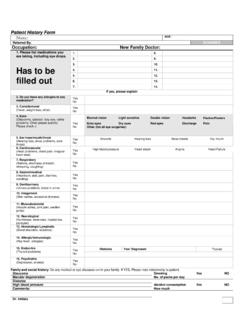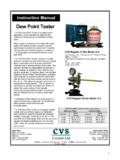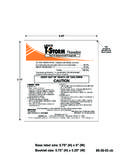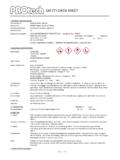Transcription of TIPS FOR THE EX-OFFENDER - Wisconsin Job Center
1 tips FOR THE EX-OFFENDER Dealing with potential employers is never an easy task for clients with criminal records. Ex-offenders who lie on the application may get hired, and then get fired if their record becomes known. Those who are honest may feel like they never even get a chance. Although there are no magic formulas for dealing with this sensitive situation, the following hints may be helpful. See your social worker, work-release coordinator, or contact the Transition Program for more information. THE APPLICATION PROCESS QUESTION/ TOPIC DON'T DO Have you ever been convicted of a felony?
2 DON'T simply say yes. DON'T lie and say that you haven't ever been convicted of a felony. DON'T leave blank. DON'T write a lengthy explanation of past convictions on the application. DO write "Yes, will discuss in interview" or something similar. DO remember that honesty is important. What was your wage/salary at your job? DON'T say the actual amount paid ($.20/hr). DO write "minimum wage." After all, a dollar a day was the minimum wage! What was your reason for leaving? DON'T use negative words like "went to jail" or "paroled." DO use terms like "relocated" or "contract ended." Both of these are true.
3 What experience do you have? DON'T lie about your experience or qualifications. Even if it helps you get the job initially, you can be fired if and when the truth becomes known (and it usually does). DO be honest. DO "sell yourself." If you have the experience, let the employer know why you should be hired! Grooming DON'T take this for granted! DO look your best, even when going to fill out an application - this will be the employer's first impression of you. You might also be interviewed on the spot. Follow-up DON'T forget that you filled out an application. DO call back within 5 - 7 days to check on the status of your application.
4 This shows you are 1 DON'T simply wait for an employer to call you back. really interested in the job. DO keep a list of the places where you filled out an application. This will make it easier to do callbacks. Volunteering Information DON'T volunteer information that might be considered "negative" by employers (for example your criminal record, substance abuse history, job terminations). If you have to explain, DO write "will discuss in interview." DO know your rights and which questions are considered illegal. (See "Examples of Illegal Interview Questions" in this packet). Overall .. DON'T give up!
5 DO remember that you will probably hear many "no's" before you get a job, but if you are willing to work at getting a job you will be successful! THE INTERVIEW PROCESS 2 DON'T DO DON'T be unprepared for questions about your criminal history. DON'T see yourself as an ex-convict unworthy of employment. DO be prepared. DO decide whether you will tell an employer directly and explain what you have learned from the situation or if you will avoid giving any information unless you are specifically asked. Our suggestion is that "honesty is the best policy." How you communicate the information makes a difference.
6 DO see yourself as worthwhile and a valuable asset who has the skills and abilities an employer needs. DO have a positive self-image and confidence in your skills and abilities to "sell yourself" to an employer. DON'T be lengthy in explaining things. DO keep it short and discuss only necessary items. When asked about your criminal conviction, DON'T say things like "The cops set me up" or "I didn't do anything wrong; it was my brother, Bob, who should have went to prison." DO be honest. DO explain what you learned from your prison experience or how you want to better yourself after being in prison.
7 DO take responsibility for the actions that led you to prison. 3 DON'T lie about your criminal background. Employers now have a way to review your criminal background on the Internet! If you are fired, it's not because you are a felon, but because you lied on your application! DO stress that although you were incarcerated, you haven't been lazy; explain things you did to stay busy or improve yourself (worked, read, etc.) DON'T stress out! DO relax and be comfortable in explaining you're criminal conviction. DO practice ahead of time. DO maintain eye contact; this shows you have nothing to hide.
8 DO believe in yourself - it will show. DO add something positive about your skills and abilities or positive information about the company. DON'T be blind to programs that can help you get a job. DO remember the Federal Bonding Program. This program allows employers to hire ex-felons and bond them if their own insurance won't. In other words, this program acts like an insurance coverage on you to protect the employer (Contact the Transition Program for more information on this program). Mention this program to the potential employer. DO remember the federal Work Opportunity Tax Credit (WOTC).
9 This is available as an incentive for employers to hire ex-offenders and others who may have difficulty in getting work. Inform the potential employer about this. How would you answer the question, "Have you ever been convicted of a crime?" Below are some examples of how to answer that difficult question! EXAMPLE 1 Interviewer: "I see from your application that you have been convicted of a crime. Will you explain this to me? Tell me about it." Applicant: "I'm glad you asked because I want you to feel comfortable hiring me. It is embarrassing for me to talk about. I want to assure you that it had nothing to do with my previous employers.
10 I took some things that didn't belong to me and as a result, I've taken the time to decide what field I would like to get into. I have enrolled in several clerical courses and can type 50 wpm. I am familiar with several software programs for word processin, and have excellent phone skills. I am very interested in learning all I can about this industry, and I know I would be an asset to your organization." -OR- "When I was younger I got mixed up with the wrong crowds and got in trouble for breaking into cars. We all do things when we are young that we regret. I used the time to my advantage by completing an air conditioning and heating training program and received my certificate.









